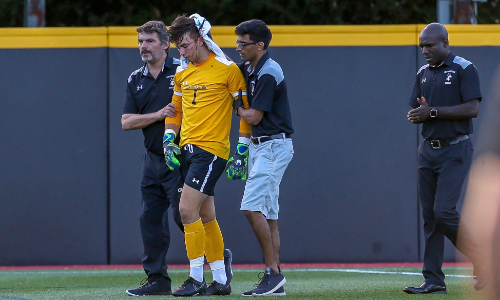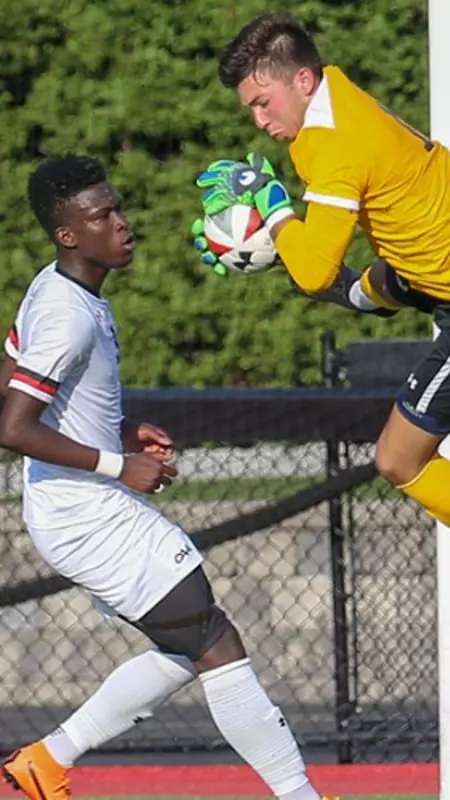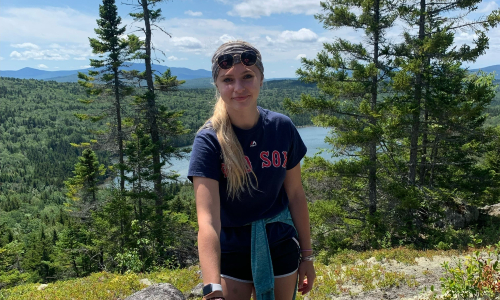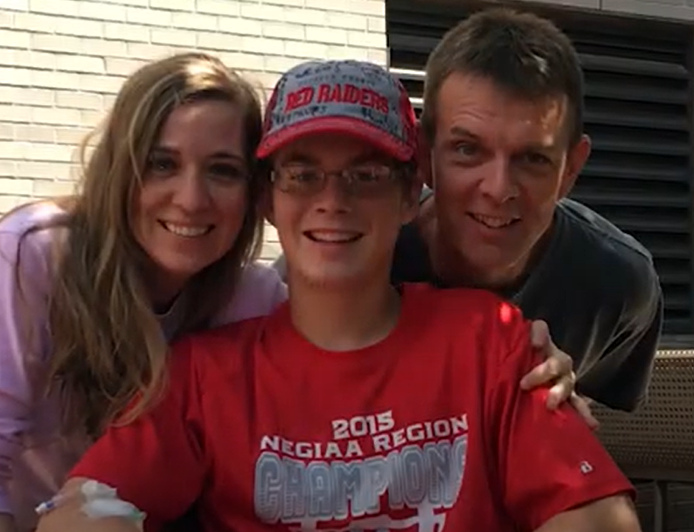Noah Abrams is a rising senior at Northeastern University and member of the men’s soccer team. In September 2018, Noah sustained a life-altering concussion from taking a knee to the head while tending goal. After a yearlong recovery, Noah shared his story in the September 2019 issue of NU’s The Red & Black student newspaper. He joined CLF in May 2020 to share what helped him cope with the emotional symptoms of a concussion in our webinar Helping Concussion and CTE Patients in Crisis.
The story below was originally published in the September 2019 issue of The Red & Black.

Posted: June 17, 2020
My family members filed into the house, one after another, greeting each other with hugs and smiles. The house was loud, filled with laughter and conversation between cousins catching up, grandparents checking in and siblings making fun of each other. My family gathered around the Thanksgiving table to celebrate the privilege of being in one place together and enjoy each other’s company.
But I couldn’t.
The sounds of their laughter pierced my ears. The thud of their footsteps vibrated my skull. The clanking of forks and knives resembled nails on a chalkboard. The only thing that I could do to escape this, my family, the thing that means the most to me in life, was to curl up in bed in a dark room, holding my head in my hands. These were the moments where my mind went places where I wish they never went. For the first time in my life the idea of killing myself seemed liked a better alternative to living life in constant suffering. I cried. Uncontrollably. Thinking about all that felt so far away from me now. My friends, my soccer career, my education, my family. I was told that feeling more emotional and sad was part of Post-Concussion Syndrome, but nothing could have prepared me for what I was actually going to experience.
I’m the kind of person who is always in a genuinely great mood. I couldn’t turn off a smile if I tried. I’m always making jokes. It’s a part of me that I really love, something that truly defines me. But in this moment, it felt like every smile, every laugh and every joke was the biggest lie. For months, I tried to put on this façade that I was still the same Noah I had always been – believe me, I tried – but after my vision went black on that field, my life was turned upside down.
The actual play happened so quickly. Having watched the video replay hundreds of times since the injury, it’s hard to figure out what I actually remember and what I think I remember. My teammates who were closest to the play describe my head being whipped back like someone hitting a bobblehead. After the initial contact occurred, they recall blood gushing out the top of my head, seeping into the Parsons turf. An Elon player ran full speed into me and the only way his speed was reduced was his knee slamming into my skull.

Being significantly undersized and lacking God-given athleticism and speed for a D1 goalkeeper has led me to develop an aggressive playing style, always wearing my heart on my sleeve and making decisions without fear. When that bouncing ball came in, I didn’t have to think twice about coming out for a play that even many goalies at the highest level would avoid. That bouncing ball was the last thing I saw before I woke up to the blurry faces of my trainer and teammate standing over me and saying my name.
“I’m fine, I’m fine,” I drastically slurred as I felt a surging need to vomit. “I’m fine, let me up.”
Clearly, we weren’t on the same page and I was forced to stay on the floor and told to relax for a second. Eventually, my trainer and coach helped me over to the bench where I had an examination and told the trainer to stitch me up for the second half of the game.
A few minutes later, I passed out again for about 15 seconds, woke up, touched my trainer’s arm and said, “Get me to a hospital. Now.”
These last six months since my concussion have been an extremely volatile and dark time for me emotionally. I always thought that people who went through hard times emotionally were soft or ungrateful. How could a person with such a great life have anything to complain about?
As my symptoms progressed, I felt like I lived in a state of hangover. I was constantly nauseous, dizzy and had a headache. I couldn’t hang out with my teammates in our living room because the combination of their voices and the TV was too much to handle. I wasn’t able to watch my team play the remaining 12 games of the season because the lights on the field and the music in the locker room felt like I was being tortured. I wasn’t able to attend class because when I thought about more than one thing at once my brain simply hurt. But the physical symptoms had a source. I knew my head hurt because I was kicked and had 18 staples. It was the anxiety and the depression that I couldn’t understand. It was the fact that I would wake up every morning with a pit in my stomach and an overwhelming sense of doom that I just could not understand. The worst part about it all was the fact this was not a visible injury. It wasn’t like a broken arm that I could see. That could be proven with x-rays, that the doctor can put into a cast and tell me how long it will take to heal.
There is no rehab. There is no clear diagnosis. There is no timeline. The only thing that I could do was sit in dark rooms and cry about everything that was taken away from me, from my sport to my identity. The only time that I felt some relief from the constant suffering was when I drank.
At least for a couple hours, my headache disappeared, and I forgot that I was in constant pain. After a night of drinking and my hangover state returned the following morning, I returned back to my regular thought process: If I jump over my fifth-story fire escape, will all my pain and suffering go away?
I never got that close to the fire escape, but even having those fleeting thoughts is scary enough. But when I experienced these dark thoughts and moments of suffering, I later realized the good in what it brought out in me. Prior to this injury, soccer was my main priority in life. What happened to me on that field and in the six months that followed was the worst thing that’s ever happened to me, but also the best. Having so much time away from the game changed my point of view. Feeling constantly anxious and depressed altered my perspective. I realized that life isn’t always about what is directly in front of me. I stopped thinking like soccer was my end-all, be-all, my sole purpose, and my only source of happiness, and I started treating it like a passion that filled me but did not define me.
There is no shame in admitting that sometimes things get so hard you can’t handle it on your own. If anyone reading this is going through a rough period in their life, sport related or not, I encourage you to seek help from your loved ones, because some things in life are too difficult to take on by yourself. Without my close friends, my teammates, my family and my coaching staff supporting me, I don’t think that I would be here today. That doesn’t make you soft or ungrateful, but it makes you human.
If I could take it back, I wouldn’t have gone out for that ball, but I will always be grateful for what the time since that injury has taught me and how it has changed me.
Suicide is preventable and help is available. If you are concerned that someone in your life may be suicidal, the five #BeThe1To steps are simple actions anyone can take to help someone in crisis. If you are struggling to cope and would like some emotional support, call the 988 Suicide & Crisis Lifeline at 988 to connect with a trained counselor. It’s free, confidential, and available to everyone in the United States. You do not have to be suicidal to call. If you’re not comfortable talking on the phone, consider using the Lifeline Crisis Chat.

